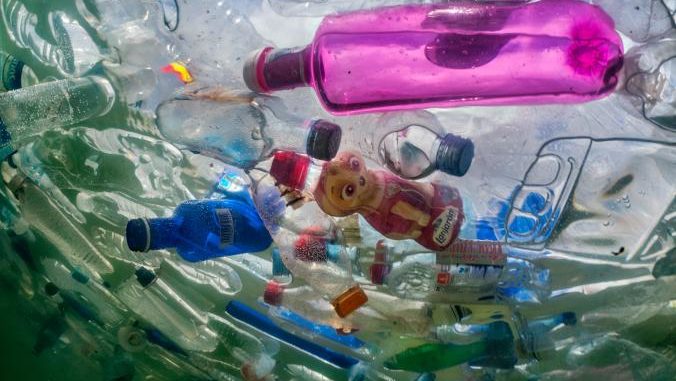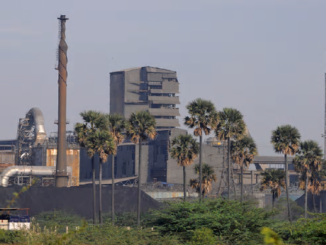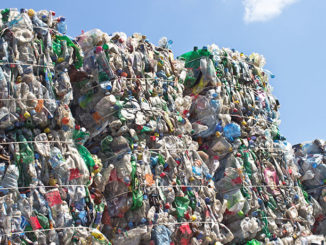
This story is part of Planet or Plastic?—our multiyear effort to raise awareness about the global plastic waste crisis. Learn what you can do to reduce your own single-use plastics, and take your pledge.
THE WORLD HAS a plastic pollution problem and it’s snowballing—but so is public awareness and action.
Each year, an estimated 18 billion pounds of plastic waste enters the world’s ocean from coastal regions. That’s about equivalent to five grocery bags of plastic trash piled up on every foot of coastline on the planet. All that plastic is causing harm to the creatures that live in the ocean, from coral reefs smothered in bags, to turtles gagging on straws, to whales and seabirds that starve because their bellies are so jammed with bits of plastic that there’s no room for real food.
New research is emerging apace about the possible long-term impacts of tiny pieces of plastic on the marine food chain—raising fresh questions about how it might ultimately impact human health and food security.
About 40 percent of all plastic produced is used in packaging, and much of that is used only once and then discarded. Less than a fifth of all plastic is recycled, though many countries and businesses are trying innovative solutions to increase that number.
National Geographic magazine devoted a special cover package to plastic in June 2018, and since then, the issue has received more attention from the media, public, and politicians the world over. Here, we track some of the developments around this important issue. We will update this article periodically as news develops.
GIANT TRASH COLLECTOR HEADS TO PACIFIC GARBAGE PATCH
September 7, 2018
The campaign to rid the world’s oceans of plastic trash marks a turning point on Saturday as a giant, floating trash collector steams out of San Francisco on a mission to clean up the Great Pacific Garbage Patch.
Over the course of the next year, the device will undergo the ultimate tests and face some tough questions: Can technology prevail over nature? Did the engineers at The Ocean Cleanup in the Netherlands invent the first feasible method for extracting large amounts of plastic debris from the sea? Or will the wilds of the open Pacific tear it to shreds, turning the cleaner itself into plastic trash? Alternately, even if a Pacific storm does not devour the device, will it attract marine animals such as dolphins and turtles and fatally entangle them?
“I don’t think it’s going to work, but I hope it does,” says George Leonard, the Ocean Conservancy’s chief scientist. “The ocean needs all the help it can get.”
UNITED AIRLINES BANS PLASTIC STRAWS FROM FLIGHTS
September 7, 2018
United Airlines today joined others in the travel industry by banning plastic straws and cocktail picks on their flights.
The airline will instead use a biodegradable bamboo alternative, starting in November.
Alaska and American airlines moved to ban plastic straws earlier this year, and some cities, like Seattle, have outlawed their use entirely.
As one of the reasons for switching to a more sustainable form of straw, United cited this alarming fact: “Because straws don’t biodegrade and are nearly impossible to recycle, it’s likely that every straw ever used still exists on our planet.”
“It’s a small, but meaningful step to help minimize the impact plastic products have on our environment,” the company said in a press release.
CARSBERG BEER DUMPS PLASTIC CAN RINGS
September 7, 2018
Danish brewer Carlsberg will become the first beer producer to ditch those evil plastic multipack rings that hold beer and other cans together for holders made of recyclable glue, according to a company press release.
Carlsberg also says it will cut the amount of plastic used in its traditional can holders by 76 percent.
Here’s how the glue-packs work: A drop of super-strong, temperature-tolerant glue is stuck on the side of a can, connecting it to the can next to it. If you want a beer, snap off a can. The glue will be recycled along with the can when it’s recycled.
Carlsberg described the move as a “world first for the beer industry.”
The Walt Disney Company announced a ban on single-use plastic straws and stirrers at nearly all its theme parks and resorts. The policy, which is set to be in place by mid-2019, will cut down on the upwards of 175 million straws and 13 million stirrers that are used at these locations each year.
Paper straws will be available upon request and, for guests with disabilities, the company is developing alternative options for traditional plastic straws. Disney will also eliminate polystyrene cups at its parks and cut down its reliance on single-use plastic bags. Instead of disposable bags, guests will have the option to buy reusable shopping bags.
Additionally, the company will reduce the amount of plastic in guest rooms by 80 percent. Over the next few years, Disney will transition to refillable amenities in hotels and on cruise ships. When single-use plastics cannot be reduced, Disney will continue to recycle and properly dispose of waste, the company says.
Disney has other conservation measures in place. In Orlando at Disney’s Animal Kingdom, plastic straws and cup lids have been banned since the park opened in 1998.
Other theme parks, including SeaWorld, Busch Gardens, and Sesame Place, have announced initiatives to phase out straws and other single-use plastics. Earlier this month, Seattle banned plastic straws, and San Francisco is working to ban straws and other plastic items starting July 1, 2019.
In July 2018, Disney was approved to purchase 21st Century Fox, the parent company of National Geographic.
NATIONAL GEOGRAPHIC TRAVEL PARTNER BANS SINGLE-USE PLASTICS
July 26, 2018
On July 25, Lindblad Expeditions, an adventure cruise company that has teamed up with National Geographic Expeditions, announced it had become 100 percent free of single-use plastics. Now, disposable plastic bottles, cups, straws, and stirrers are entirely banned from the fleet’s 13 ships.
“The ocean is under major assault on so many fronts, and its protection is both a business mission and a personal passion,” Lindblad Expeditions CEO Sven Lindblad says in a press release. “The health of our planet is dependent on our oceans, and it is essential that we change our behavior with regard to plastics.”
Lindblad is known for its trips all over the world, particularly to places like Alaska and the Galápagos Islands. The company began working toward this plastic-free goal in 2007 when it banned single-use water bottles from its ships. Instead, it gave guests stainless steel bottles that could be refilled at filtered water stations on the ships. According to a study by the Adventure Travel Trade Association and the nonprofit Travelers Against Plastic, the average adventure travel operator uses nearly 30,000 single-use plastic bottles each year.
About 80 percent of tourism takes place near coastal areas, putting our oceans at a higher risk of plastic pollution. When packing for air travel, consider using three-ounce reusable containers for your toiletries and load them into a durable transparent washbag instead of a plastic bag. On flights, bring your own earphones and turn down “comfort bag” items wrapped in plastic. Bring your reusable water bottle with you and fill it up when you can.
For more tips, read how one of our writers attempted to explore Belize plastic-free.
BIG COMPANIES TAKE AIM AT PLASTIC STRAWS
July 13, 2018
Retail, restaurant, and consumer-facing companies could potentially make a big impact in the fight to reduce plastic straw use. They drive much of the demand for straws from plastic manufacturers.
But these businesses are increasingly responding to consumer pressure.
Starbucks is among the most recent companies to announce they’ll ditch plastic straws—in this case by the end of 2020. Instead of getting sucked up through a straw, their cold drinks will be served in containers with special plastic lids. Those lids are less likely to get stuck up a turtle’s nose and should prove more recyclable than straws, but the company has still received some pushback because the lids are still made of plastic.
McDonald’s is also planning to phase out plastic straws at their UK and Ireland locations, coinciding with UK and EU proposals to cut down single-use plastic.
Among the other companies that have moved to reduce how much they use plastic: Bacardi Rum plans to cut their straw usage over the next two years by a billion, food service management giants Bon Appétit Management and Aramark plan to reduce their single-use plastics by 2019 and 2022, respectively, Alaska Airlines will begin phasing out plastic straws this summer, and American Airlines will begin phasing out plastic straws this summer.
It remains to be seen if companies follow through on their goals, and it’s clear that banning plastic straws is not going to solve the whole pollution problem. Supporters say reducing our use of straws is an easy first step, while detractors say it could distract from more important issues. In either case, taking aim at plastic straws has become rather fashionable this summer.
CHILE’S BAN ON RETAIL PLASTIC BAGS STANDS
July 6, 2018
Chile’s Constitutional Court ratified a bill that bans retail use of plastic bags across the country on July 6, ruling against an appeal that had been filed by the plastics industry. In June, Chile’s Congress had unanimously approved the new ban, citing concerns of plastic pollution in the ocean and on land.
The country’s Association of Industrial Plastics had sued to block the new law on constitutional grounds. But the court rejected their arguments.
Large retailers will have six months to phase out single-use plastic bags, while small businesses will have up to two years. The ban builds on a law passed under the previous president that had called for a prohibition on plastic bags along the country’s 4,000-mile coastline.
In announcing the new ban, Marcela Cubillos, Chile’s environment minister, told the New York Times, “We are convinced that our coast imposes an obligation to be leaders in cleaning up our oceans.”
Chile’s ban is the first country-wide one in the Americas. Similar banshave been passed in China, Kenya, France, and elsewhere. Many regional and local areas have bans or other restrictions, including taxes or fees aimed at discouraging the use of single-use plastic bags.
SEATTLE BECOMES FIRST U.S. CITY TO BAN PLASTIC STRAWS AND UTENSILS
July 1, 2018
In an attempt to reduce the amount of plastic waste polluting the land and water, Seattle banned the use of plastic straws and utensils in bars and restaurants starting July 1.
The roughly 5,000 eateries in the city are being encouraged to eschew providing straws or disposable utensils, or at least to switch to paper alternatives. A less green but still legal option, according to the city, is compostable plastic straws or utensils.
“Plastic pollution is surpassing crisis levels in the world’s oceans, and I’m proud Seattle is leading the way and setting an example for the nation by enacting a plastic straw ban,” Seattle Public Utilities General Manager Mami Hara said in a statement.
A similar ban that was proposed for Hawaii was defeated by opposition from industry. Other proposed bans are being debated in San Francisco, New York, and Washington, D.C., among other places.
Some advocates for the disabled have warned that straw bans need to take into account special needs. (Learn more about the history of plastic straws and other efforts to remove them.)
PHOTOS OF ANIMALS AND PLASTIC
A great bowerbird in Queensland, Australia, decorates its home with broken glass, plastic toys, and other pieces of human trash.
PHOTOGRAPH BY TIM LAMAN, NATIONAL GEOGRAPHIC CREATIVE
EU, UK, AND INDIA PROPOSE PLASTIC BANS
May 28, 2018
In draft rules released May 28, the European Commission proposed a ban on 10 common items that it says make up about 70 percent of the litter in EU waters. This includes plastic straws, drink stirrers, plates, and more.
The rules would still need approval from member states and the European Parliament to move forward. They would likely not go into effect for several years.
The proposed law would also mandate that EU countries collect and recycle 90 percent of plastic bottles by 2025. Plastic producers would be on the hook for most of the expense of waste management and cleanup efforts.
In April, British Prime Minister Theresa May announced her intent to establish a ban in her country on sales of single-use plastics, including straws and cotton swab handles.
Calling plastic waste “one of the greatest environmental challenges facing the world,” May said she would work with industry to develop alternatives. An estimated 8.5 billion plastic straws are tossed out in the U.K. every year.
On June 5, Indian Prime Minister Narendra Modi announced his intent to eliminate all single-use plastic in the country by 2022. With a fast-growing economy and population of 1.3 billion, India struggles to manage its vast waste stream, and is a significant contributor to global ocean plastic.
“Let us all join together to beat plastic pollution and make this planet a better place to live,” Modi said.
Experts caution that Modi’s goal is far from being realized, and would likely take significant changes and investment from industry and the public. Already, industry lobbyists have taken aim at the efforts. The state of Maharashtra, home to megacity Mumbai, eased a ban on single-use plastic just a week after it unveiled the plan this summer. The state is working on a number of exemptions, for plastic of a certain thickness, products of a certain size, medical equipment, and other uses.
Source: https://www.nationalgeographic.com/environment/2018/07/ocean-plastic-pollution-solutions/
Visits: 77




Be the first to comment